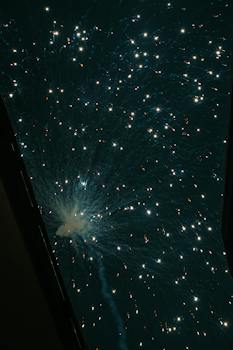

-
Table of Contents
Embrace the Infinite Shadows
Introduction
The Increasing Darkness of Our Universe refers to the phenomenon of the universe gradually becoming darker over time. This concept is rooted in the understanding of cosmic expansion and the eventual fate of our universe. As galaxies move away from each other due to the expansion of space, the light they emit becomes stretched and redshifted, resulting in a dimming effect. Additionally, the depletion of available gas and dust for star formation further contributes to the increasing darkness. This gradual fading of light has significant implications for the future of our universe and our understanding of its ultimate destiny.
The Mysterious Origins of Dark Matter and Dark Energy
The universe is a vast and mysterious place, filled with countless wonders and phenomena that continue to baffle scientists. Among these enigmas are dark matter and dark energy, two elusive entities that make up the majority of the universe. While their existence has been theorized for decades, the true nature and origins of dark matter and dark energy remain shrouded in uncertainty.
Dark matter, as its name suggests, is a form of matter that does not emit, absorb, or reflect light. It is invisible to our telescopes and can only be detected through its gravitational effects on visible matter. Scientists estimate that dark matter makes up about 27% of the universe, while ordinary matter, the stuff we can see and touch, accounts for a mere 5%. This means that the vast majority of the universe is composed of an invisible substance that we know very little about.
The origins of dark matter are still a subject of intense debate among scientists. One prevailing theory suggests that dark matter is made up of weakly interacting massive particles, or WIMPs. These hypothetical particles would interact with ordinary matter only through gravity and the weak nuclear force, making them extremely difficult to detect. Despite numerous experiments and observations, however, no direct evidence of WIMPs or any other dark matter candidate has been found.
Dark energy, on the other hand, is an even more perplexing concept. It is a form of energy that permeates all of space and is responsible for the accelerated expansion of the universe. Unlike dark matter, dark energy does not clump together in galaxies or clusters but instead fills the empty spaces between them. Scientists estimate that dark energy accounts for about 68% of the universe, making it the dominant force in shaping its fate.
The origins of dark energy are even more mysterious than those of dark matter. One possibility is that it is a property of space itself, known as vacuum energy or the cosmological constant. According to this theory, empty space is not truly empty but is filled with a constant energy that drives the expansion of the universe. Another hypothesis suggests that dark energy is a manifestation of a new fundamental force or field that has yet to be discovered.
Despite the lack of concrete answers, scientists continue to search for clues about the origins of dark matter and dark energy. They conduct experiments using powerful particle accelerators, such as the Large Hadron Collider, in the hopes of producing and detecting dark matter particles. They also study the cosmic microwave background radiation, the afterglow of the Big Bang, to gather insights into the early universe and its composition.
Understanding the origins of dark matter and dark energy is not just a matter of curiosity; it has profound implications for our understanding of the universe and its future. If we can unravel the mysteries of these enigmatic entities, we may gain insights into the fundamental nature of matter, energy, and the forces that govern the cosmos. It is a daunting task, but one that scientists are determined to pursue, as they strive to shed light on the increasing darkness of our universe.
Exploring the Implications of an Expanding Universe

The universe is a vast and mysterious place, filled with countless galaxies, stars, and planets. For centuries, scientists have been studying the cosmos, trying to unravel its secrets and understand its origins. One of the most fascinating discoveries in recent years is the fact that our universe is expanding. This revelation has profound implications for the future of our universe and the fate of everything within it.
The concept of an expanding universe was first proposed by the Belgian astronomer Georges Lemaître in the 1920s. He theorized that if the universe was expanding, then at some point in the past, everything must have been condensed into a single point of infinite density. This idea eventually became known as the Big Bang theory, which is now widely accepted as the most plausible explanation for the origins of our universe.
But what does it mean for the universe to be expanding? Essentially, it means that the space between galaxies is getting larger over time. As the universe expands, galaxies are moving away from each other, creating more and more empty space between them. This phenomenon has been observed through the redshift of light from distant galaxies, which indicates that they are moving away from us.
The implications of an expanding universe are far-reaching. One of the most significant consequences is the increasing darkness of our universe. As galaxies move away from each other, the light they emit becomes stretched and diluted. Over time, this means that the overall brightness of the universe will decrease. Eventually, the night sky will become darker and darker, with fewer and fewer visible stars.
This darkening of the universe has profound implications for the future of life as we know it. As the universe becomes darker, it will become increasingly difficult for astronomers to observe and study distant galaxies. This could hinder our understanding of the cosmos and limit our ability to make new discoveries about the nature of the universe.
Furthermore, the darkening of the universe has implications for the long-term survival of life itself. As the universe expands and galaxies move away from each other, the supply of new stars and planets will dwindle. Eventually, there will be fewer and fewer places where life can arise and thrive. This raises the question of whether life in the universe is ultimately doomed to extinction.
However, it is important to note that the darkening of the universe is a gradual process that will take billions of years to unfold. In the meantime, scientists are working on new technologies and techniques to study the cosmos, such as the development of more powerful telescopes and space probes. These advancements may help us overcome the challenges posed by the darkening universe and continue to explore the mysteries of the cosmos.
In conclusion, the concept of an expanding universe has profound implications for the future of our universe and the fate of everything within it. The increasing darkness of the universe is a consequence of this expansion, as galaxies move away from each other and the overall brightness of the universe decreases. This has implications for our ability to study the cosmos and raises questions about the long-term survival of life. However, with advancements in technology and our continued exploration of the cosmos, we may yet uncover new insights and discoveries that will shape our understanding of the universe and our place within it.
Unraveling the Fate of Stars in a Darkening Universe
The universe is a vast and mysterious place, filled with countless stars and galaxies. For centuries, humans have been fascinated by the beauty and wonder of the night sky. However, recent scientific discoveries have revealed a disturbing truth: our universe is slowly but steadily growing darker.
One of the key factors contributing to the increasing darkness of our universe is the expansion of space itself. Scientists have long known that the universe is expanding, but recent observations have shown that this expansion is accelerating. As space expands, the distance between galaxies grows larger, causing them to move away from each other at an ever-increasing rate.
This expansion has profound implications for the fate of stars. As galaxies move farther apart, the gravitational forces that hold them together weaken. Over time, this weakening of gravity can cause stars to be ripped apart, leading to their eventual demise. As more and more stars meet this fate, the overall brightness of the universe decreases.
Another factor contributing to the darkening of our universe is the depletion of fuel for star formation. Stars are born from clouds of gas and dust, which collapse under their own gravity. As these clouds collapse, they heat up and eventually ignite, giving birth to new stars. However, the supply of gas and dust in the universe is not infinite.
Over time, the gas and dust in the universe become depleted, making it increasingly difficult for new stars to form. As a result, the rate of star formation decreases, leading to a decline in the overall brightness of the universe. This depletion of fuel for star formation is a natural consequence of the aging and evolution of galaxies.
Furthermore, the increasing darkness of our universe is also influenced by the lifespan of stars. Stars are not eternal; they have a finite lifespan, determined by their mass. Massive stars burn through their fuel quickly and end their lives in spectacular explosions called supernovae. These explosions release vast amounts of energy and light into space.
However, once these massive stars have exhausted their fuel, they collapse under their own gravity, forming black holes. Black holes are regions of space where gravity is so strong that nothing, not even light, can escape. As more and more stars reach the end of their lives and collapse into black holes, the overall brightness of the universe diminishes.
In conclusion, the increasing darkness of our universe is a result of several interconnected factors. The expansion of space, the depletion of fuel for star formation, and the lifespan of stars all contribute to the gradual decline in the overall brightness of the universe. While this may seem like a bleak future, it is important to remember that the universe is a dynamic and ever-changing place. Scientists continue to study and unravel the mysteries of the universe, and who knows what new discoveries may lie ahead.
Q&A
1. What is the increasing darkness of our universe?
The increasing darkness of our universe refers to the phenomenon of the universe becoming progressively darker over time due to the expansion of space and the fading of light sources.
2. What causes the increasing darkness of our universe?
The increasing darkness is primarily caused by the expansion of space, which leads to the stretching of light waves and a decrease in their energy. Additionally, the fading of stars and the eventual depletion of their fuel contribute to the overall darkness.
3. How does the increasing darkness of our universe impact us?
The increasing darkness of the universe has implications for our understanding of the cosmos. It suggests that the universe is heading towards a state of low energy and decreased activity. It also poses challenges for future astronomical observations as the fainter light sources become harder to detect.
Conclusion
In conclusion, scientific evidence suggests that the universe is experiencing an increasing darkness. This is primarily due to the expansion of the universe, which causes galaxies to move away from each other at an accelerating rate. As a result, the light emitted by distant galaxies becomes redshifted and eventually undetectable, leading to an overall darkening of the universe. Additionally, the depletion of available gas and dust for star formation further contributes to the increasing darkness. While the exact future of our universe remains uncertain, current observations indicate a gradual fading of light and an eventual state of cosmic darkness.











